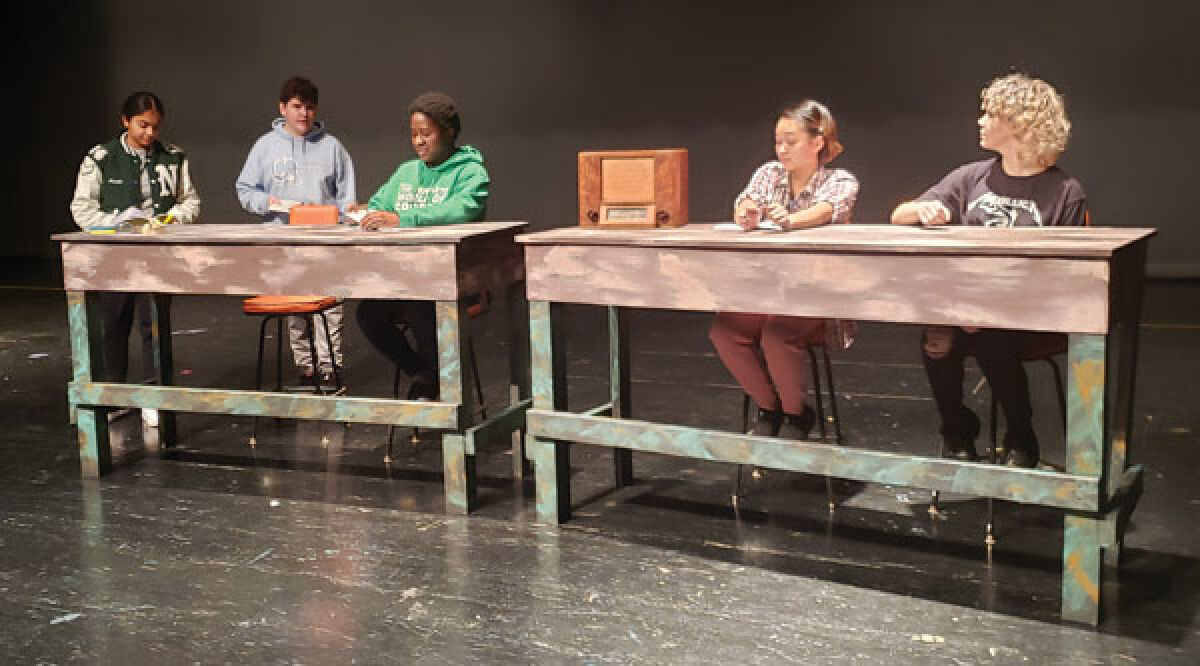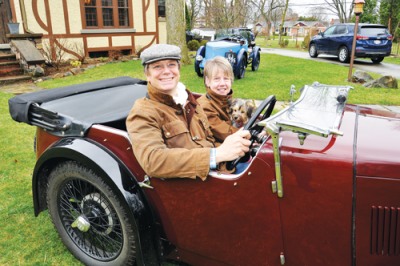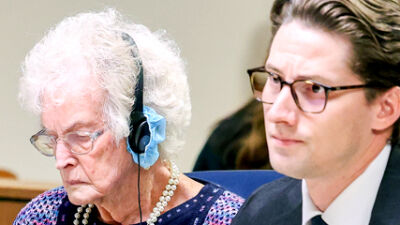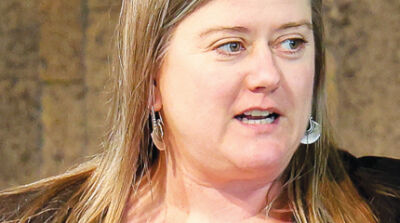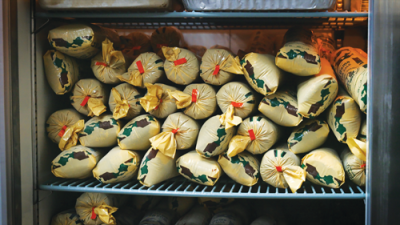NOVI — The Novi High School Theatre will shine light on the subject of radium poisoning and how it impacted women in the workforce during the Roaring ’20s with its production of the one-act play “These Shining Lives.”
The historical play discloses how the Radium Dial Co., which was located in Ottawa, Illinois, knowingly exposed its workers to the carcinogen radium and the hardships that four of its female employees and their families suffered as a result of the poisoning.
“It spoke to me because I think it gives each of these six actors something to do. It’s not, ‘Oh you’re in the show and you have a couple lines and then you’re done,” said theater director Heather McKaig. “I find the writing really affective. … I think it’s a really powerful story. It’s an era of history I think we don’t talk about. That most people, I know anyway, don’t realize there were women who died because they had jobs that involved painting numbers on clocks, stopwatches and watches that use radium powder, and so they died and the companies knew long before the women got sick that it had deleterious effects, and they didn’t stop the use of it because they were making a lot of money on all of these glow-in-the-dark things. The idea that you could turn the lights off and still see what time it was, was revolutionary and people were really excited.”
She said that people will see a powerful story of women who suffered under their employer and brought forth change so that people can sue an employer for exposing them to harm.
Arushi Singh, 16, who plays the lead character, Catherine Donahue, described the play as quickly going from a light and excited mood when her character becomes one of thousands of women joining the workforce, to dark as they discover that they are being slowly poisoned through their work.
She said to get into character, she and her colleagues have done extensive research on the women they are portraying.
“I think it is just visualizing a situation that I will never understand. Like, I don’t know what it’s like to have radium poisoning, as funny as it sounds. I’ve never had to deal with the stress of knowing I’m not going to make it and have people that I’m going to leave behind,” said Nicole Watt, who plays Charlotte Persell, one of the women who works at the factory.
Singh said she believes the play handles a dark topic “really well.” She said that the playwright, Melanie Marnich, instructs actors not to play the women as victims.
“It may seem like they are victims, but they really took advantage of an opportunity and pioneered the way for other female workers,” said Singh. “So, I like that it is not victimizing the women. It is showing that they persevered through something.”
Neel Archis Manish, 15, who plays Singh’s husband, Tom Donahue, said he thinks it is amazing that McKaig chose and was allowed to tell the story, as he believes it is not one that is generally chosen. Archis Manish said that he recently came to the U.S. from Maharashtra, India, and that everything he had seen of drama club in the U.S. referenced only the musical.
“The complexity of thinking that it takes to choose plays is something that I had not been aware of. It’s nice to see that it’s not just happy starting, happy middle, happy end,” he said. “That it’s a real story.”
McKaig said she had originally selected a different play but had to find a play that required fewer actors after the biannual choir trip schedule conflicted with that of the one-act play competition. She said this production, with only six actors, is the fewest actors she has worked with for a one-act production by far.
According to McKaig, the one-act plays usually utilize the skills of approximately 12 actors. However, she said that because many of the more experienced actors were not available to perform, some freshman actors were given an opportunity to perform that they might not have otherwise had.
The students will be competing on Feb. 4 in the Michigan Interscholastic Forensic Association’s annual one-act play competition, which the school won last year. Every school will be performing a different play. Students are judged on three areas of acting: physical, vocal and overall affect. They will also be judged on all technical areas, such as lights, sound and costumes.
McKaig said the competition changes the theme between comedy and serious plays every year. She said the school chooses to compete in the Main Stage category, which has a serious theme this year, while schools who compete in the Studio category will be performing comedies.
“We were not interested in Studio, because it just doesn’t give our tech kids as much to do,” said McKaig. “It is limited in what you are allowed to do for set. There is no lighting. There is no sound. So, we have always done Main Stage.”
“My biggest selling point for coming to see the show is not the play,” said McKaig. “For me, it’s that the one act is completely unique.”
McKaig explained that theater is inherently collaborative, but one-act plays take that collaboration to a special level.
“If the kids do not operate and function as a cohesive team, they are sunk, and that’s everybody. Everybody who is working backstage, everyone who has designed something, everyone who is onstage. It is a comprehensive thing,” McKaig said.
She said the students will have 25 minutes “spike time” to put their set together, lay out props, costume presets, conduct a sound check and do a lighting check. She said that is all part of the show.
The directors are only able to verbalize reminders and are not allowed to physically help the kids with anything unless there is a safety issue.
Construction head Thomas Smith, 17, said that he enjoys theater and set building, as he loves working with his hands and building things.
“I absolutely love it. It is amazing,” Smith said.
Props master Alyssa Kraus, 16, said she has worn many hats within the theater but loves props because many people don’t notice them but would surely notice if they were gone.
She said that the greatest challenge for the props with this play is to make everything look like it would have in the 1920s.
Costume designer Isabelle Shi, 17, said that it is very challenging to find period costuming for the working women in the 1920s. Shi said she got into costuming as it is a way of nonverbally telling the story.
“I just thought it was really cool how much of the story you can tell from their clothing,” said Shi. “For example, Mr. Reed is an employee of the company Radium Dial, and it is implied that he knows what is causing these girls to get sick, but he doesn’t say anything. … We talked about his character and we’re putting him in morbid gray because while he is doing his job, but he also knows that this is a danger. So I put him in a gray three-piece suit for the color symbolism,but to add onto that throughout the show, he dons more clothing like he is getting more gray. It also puts the difference between the classes (in view), because you can tell he is more well off.”
She said the stage crew is so important because there is so much going on behind the scenes that is needed to bring the show to life.
“You can have the actors on the stage saying their lines, doing it well, but the essence of the show is not truly there unless you have the period costumes, the props that show it’s the time period or the lights. It’s just so much of the crew goes into the final product, and people don’t really think about that. So, I think it’s really cool being a part of that,” Shi said.
The students will compete in the regional competition on Feb. 4 and then perform the play for the public Feb. 6-7. If they advance to the finals again this year, the competition will take place Feb. 17-18.
The public performances will take place at 7 p.m. Feb. 6-7 at Novi High School, 24062 Taft Road. The cost is $5 for tickets at the door. McKaig recommended arriving at 6:30 p.m. to watch the setup.
 Publication select ▼
Publication select ▼